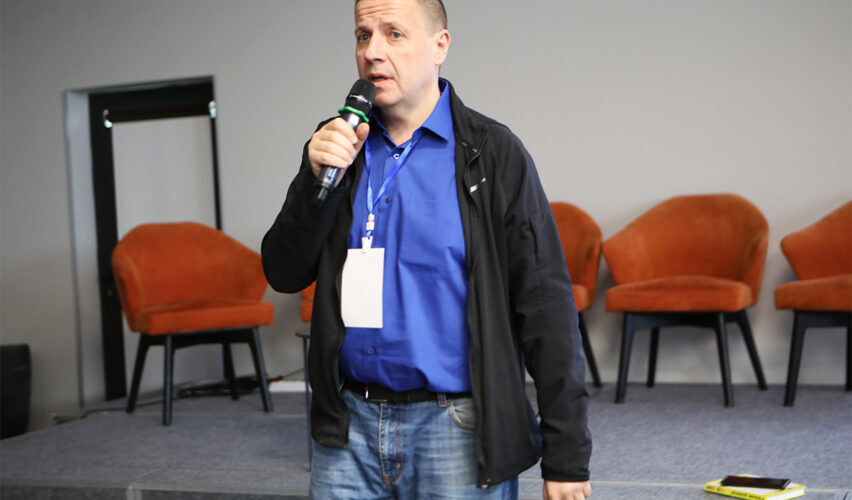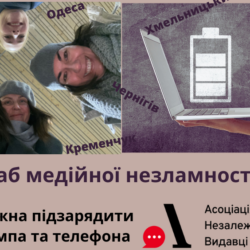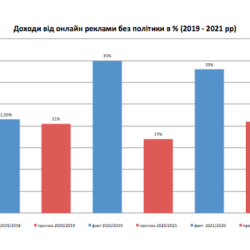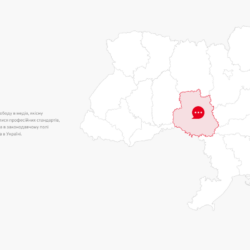We continue the series of useful publications based on the results of our event – the XII Congress of Information Sites. Currently – about the financial success of the media. Thanks to Daryna Kazmirenko (Media Detector) for preparing the material
If the media has managed to define and segment its target audience, it should begin to gain their trust. After all, this is the best springboard for building a successful and profitable mass media. It is no less important to have an effective editorial office, a productive sales house and motivated employees. The co-founder of RIA, hotels24.ua, 20minut.ua, 20.ua, MoeMisto.ua advised how to win the trust of the audience, build relationships in the team, increase traffic and the audience of online media, improve the work of the sales department, at the XII Congress of Information Sites and City Portals Oleksandr Chovgan, executive director of Gazeta.ua and Kraina magazine, Andriy Klymenko, co-owner of Rivne.Media, director of IT company PrantMedia, Ihor Glyakh.
How to increase trust in mass media. Recommendations from RIA Media

Oleksandr Chovgan, co-founder of RIA, hotels24.ua, 20minut.ua, 20.ua, MoeMisto.ua, says that quality journalism remains relevant in the 21st century, despite robotization. In his opinion, robots are unable to replace journalists, whose quality work is measured by the trust of the audience. “Most recently, the World Association of Publishers conducted a study on the robotics of journalism. They came to the conclusion that artificial intelligence can cope with automatically writing texts about sports, but there is no more success anywhere and is not expected,” he said. Oleksandr Chovgan said that the prerequisites for strengthening the audience’s trust in the media are:
- The value of news. As an example, Oleksandr Chovgan gave the author’s diagram of the process of acquiring the value of The New York Times news:

He advises the media to focus on data journalism, expert analysis, in-depth reviews, expert commentary and more. “These elements will make your media more in demand due to the level of necessity and value of news,” says Oleksandr Chovgan. “But to be successful, the media must fill all the areas shown in the diagram.”
- The pyramid of trust will help build relationships between the media and the audience

Oleksandr Chovgan drew attention to the fact that the key element of any communication is knowledge, that is why the basic step is “Know yourself”. In general, each step of this pyramid organically follows from the previous one, so it is worth paying attention to all its elements. “To find a common language with your audience, respect, interact, be transparent and love your reader,” Oleksandr added.
- Hypnosis. According to the president of the media corporation RIA, “all communication is hypnosis.”

- Temperament of the audience. To understand the tastes of the audience, segment it by temperament:
logical person – makes decisions based on a large number of parameters. A user who will definitely read the page to the end (it is possible that he will read it again) and will definitely compare the content with the content of competitors;
impulsive person – makes quick, emotional decisions whether to read or not. Only perceives titles, subtitles and looks at pictures. At the same time, such users rarely read the entire text;
a caring person is a socially oriented user. It is important to him how the content helps other people and whether the number of views in the news is high.
- Hormones. Oleksandr Chovgan says that the audience seeks to achieve happiness and catharsis from the content, and four hormones of happiness are responsible for this:
dopamine is a novelty. The user needs unique and authentic content, not “rewrite” or “copy-paste”;
serotonin is respect. A sense of social importance, when the user feels respect for himself from the publication;
oxytocin is trust. “Transparency, balance of opinions, honesty in the publications of your mass media are the key to high trust of your audience,” claims Chowgan.
endorphin is leadership. The media should give every reader a sense of leadership. This can be achieved by letting your audience know that your media is superior to your competitors.
- No cheating. The majority of the audience, noticing deception or improper behavior on the part of the media, stops following it, switching to competitors. Oleksandr Chovgan says that mass media should respect everyone who reads or watches them. “Don’t undermine your credibility by deceiving consumers. Be honest with your content consumers. The reader should feel psychologically safe while consuming your content,” he clarified.
Construction of a productive sales house. Recommendations from Gazeta.ua

Executive director of Gazeta.ua and Kraina magazine, former executive director of Ukrainian Pravda Andriy Klymenko told how to build a sales department that will sell a million:
- Go hunting together. “During the hunting of mammoths in tribes, every participant was important, not only the leader,” Klimenko drew a parallel with sales houses. He advises attracting sales managers who know how to work in a team and who are united by one goal – potential customers. At the same time, the leader’s task is to develop team spirit and a favorable atmosphere in the team.
- “Read” the customer. The executive director of Gazeta.ua compared the work of salespeople to how they read the emotions of pets: “Our pets understand us quite clearly. Look closely at them, they are able to determine your mood and desire. Be an animal. Turn on your intuition to get to know your potential customer.”
Before meeting with a client, you should look at his pages in social networks, learn more about his hobbies, family, music preferences, etc. According to Klymenko, such training can bring millions of hryvnias in the future.
- Be fair to the client, the editor, and yourself. “Mediums are the same children with the highest sense of justice when someone tries to unfairly share a piece of candy between them. When management behaves dishonestly, it demotivates and infuriates the team,” Andriy Klymenko said, adding that it’s normal to admit mistakes and point them out to colleagues.
4. Analyze the past, but also dream about the future. Any experience is a result from which you can learn. Even if the agreement did not take place, it is worth analyzing the reasons for such a result.
“Ukrainian Pravda” was one of the first on the market to sell native advertising. It was a very difficult process, I started it personally with the MTS brand. The whole PR market was jeans then. It was crazy money, no one even wanted to hear anything about special projects, because it is unprofitable. A million ideas were generated, and maybe three were implemented in a whole year. Now, this leading media has a plan for the release of the ads for months, there are not enough announcements to display expensive, good advertising,” he said.
- Motivate. Andriy Klymenko says that money is not the goal in media: “Enjoy sharing this ‘killed mammoth’ with your team.” Don’t be stingy with bonuses or raises for your employees who really deserve it.”
- Roll up your sleeves and dig your hole together. Klymenko advises media managers to work together as a team and remind their subordinates of a common goal.
7. Don’t let the shepherds beat the wolves. Andrii Klymenko drew attention to frequent cases when the sales manager turns into a “shepherd who surrounds a specific circle of regular customers, bypassing potential ones.” As one solution, he suggests always keeping a sales job open. “You need salespeople who are motivated by money, who are hungry like wolves for new prey. If you don’t change anything, your sales force will eventually turn into a herder that will drag your sales down sharply,” he claims.
- The best salesperson is the client’s advocate. A sales manager is an intermediary between two companies. If he found a new client and defends his interests, it is worth understanding and taking his side. “Sales is by no means an enemy, listen to him: he is the one who will conclude a successful advertising contract with a client that is quite profitable for your company,” Andriy explained.
- Selling is the ability to listen and only then convince. A ready-made set of ideas without sufficient familiarity is a direct path to the breakdown of the agreement between the company and the client. First, Klymenko recommends, you should listen to the client or talk about banal things. At the first meeting, it is necessary to listen and note down the “pain” of the client, for example, regarding a sharp decrease in product sales. Then you can already come to the second with “treatment”: strategies and a further plan; rather than with prime ideas unrelated to the query.
- Madness. Creative. Courage. As Andriy Klymenko says, creativity is indispensable in the field of advertising and sales — authenticity runs through all materials. It is worth studying and analyzing competitors, but not using their models.
How to automate the work of online editing. Recommendations from Rivne.Media

The co-owner of Rivne.Media, the director of the PrantMedia IT company Ihor Glyakh told how to automate the work of the editorial office and increase the traffic of online media:
- Convenient site management system. Igor Hlaikh noted that the biggest problem for the media when publishing materials is adding the main photo: “As a rule, there is no archive in the editorial office, no one wants to create and maintain it separately, these are additional resources.” Therefore, he advises to create your own platforms or use those that allow you to automatically search for illustrations by hashtags. For this, you need to remember to always tag your materials.
2. A small number of rubrics. Mass media should get rid of unnecessary sections, because sometimes even journalists find it difficult to decide in which section to publish material. Therefore, it is worth leaving only the main sections, for example, “News of Ukraine” and “News of the city” instead of “News of Rivne”, “Road accidents” and “Important events”.
3. Allocation of Liability. Rivne.Media employs three journalists who take turns performing the duties of editorial editor and proportionally distribute tasks among themselves. “We have a rotation system: there is a responsible issue editor who changes every week. That is, every journalist in one way or another is in the position of graduate editor. This is mutually beneficial help, because the journalist is eager to help the editorial editor with the materials, realizing that he will eventually end up in this place,” Igor said.
- Lack of competition – this should be the credo of the editorial office. The manager should promote the peaceful establishment of relations in the team, evenly distribute responsibilities and encourage the editorial staff with bonuses. The manager’s task, Gleich emphasized, is to convince the editors that they are working towards a common goal, where there is no “best” and “worst” employee.
- The news time from 6 to 12 is prime time, most people read media in the morning. Ihor Glyakh does not advise overloading users with numerous lengthy articles at this time, instead publishing short news notes.
- Full operation of the site on weekends and holidays. In Gleich’s experience, if the editorial office underestimates the publication of news on the weekend, it will be quite difficult to get a lot of traffic on weekdays. He clarified that a certain percentage of users read media only on weekends, so it is worth remembering that these are full days when the audience also consumes news.
- Promising posts come out after 8:00 p.m. — the most active and convenient news viewing time of the day. The co-owner of Rivne.Media noted that this is the best time for unique news and quality materials.
- Maximum unique content. Igor Hlaikh believes that there is no place for “copy-paste” in journalism, only “rewrite” and exclusivity. He also recommended using free and paid platforms to check the uniqueness of the content.
- Prompt release of current news. Submission of information to online media should be as fast as possible, but with a balance between speed and accuracy and verification of information.
- Traffic Generating Content. Igor Hlaikh says that sometimes the content, even of high quality, does not gain the expected reach. Instead, traffic can be made by other materials. From the experience of Rivne.Media, horoscopes, holiday greetings, coronavirus, help, search for missing people, rest, weather, prices gain the most traffic.
Daryna Kazmirenko, Media Detector
Photo: Getty Images, Association of Independent Regional Publishers of Ukraine, screenshots















